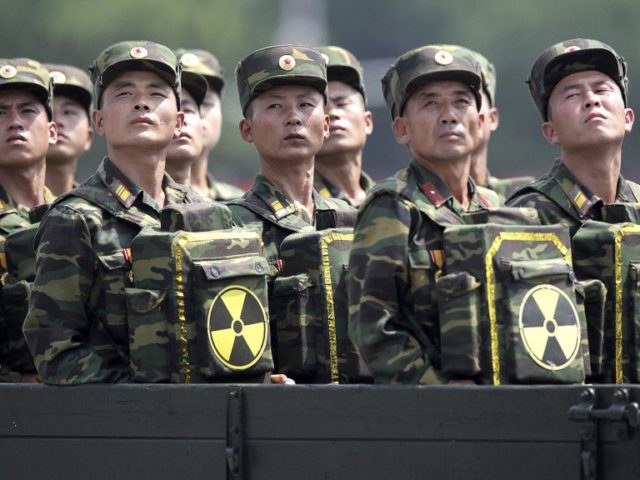The International Atomic Energy Agency (IAEA) published a report on Monday stating there is no indication North Korea is truly abandoning its nuclear weapons program.
The U.N. watchdog agency said the few steps taken by Pyongyang so far have been largely theatrical and do not represent a meaningful dismantling of the rogue Communist nation’s nuclear capability.
The IAEA report made it clear that verification is extremely difficult to conduct in North Korea, so the agency’s “knowledge of the DPRK’s nuclear program is limited, and, as further nuclear activities take place in the country, this knowledge is declining.”
That sounds like a tactful way of saying that North Korea is growing less transparent as the “denuclearization” process ostensibly continues, which is the exact opposite of what the international community desires, and quite remarkable given how opaque North Korea was to begin with.
Based on the few verification tools available to it, primarily satellite imagery and the trickle of “open source” information available from North Korea, the IAEA warned that a new plutonium reprocessing plant appears to be under construction at the Yongbyon nuclear power plant, while a new site near Pyongyang has characteristics “not inconsistent with a centrifuge enrichment facility.”
Both of these facilities would be useful for producing nuclear warheads.
Despite the glum IAEA report, U.N. Secretary-General Antonio Guterres on Monday welcomed diplomatic progress on the Korean peninsula, highlighting this week’s reunions of families separated by the Korean War.
Guterres optimistically declared he “looks forward to discussing how he can further support the parties in their diplomatic efforts to bring sustainable peace, security, and complete and verifiable denuclearization of the Korean peninsula during the upcoming high-level week of the United Nations General Assembly.”
U.S. President Donald Trump is scheduled to attend the U.N. gathering in New York City along with South Korean President Moon Jae-in. North Korean dictator Kim Jong-un will send his foreign minister Ri Yong-ho to attend the meeting, which begins on September 26.
The IAEA report can be most pessimistically interpreted as a sign that denuclearization has failed. U.S. and U.N. officials might be reluctant to state this openly or confront the North Koreans in public because they want to encourage diplomatic progress between the Koreas. They are reluctant to completely extinguish the flickering flame of denuclearization hopes by calling Kim Jong-un a fraud.
A great deal of what happens next will depend on what the Trump administration expected to achieve by this point. Some of the president’s advisers are clearly familiar with North Korea’s long history of making false promises and theatrical gestures, pocketing the concessions offered in return, and resuming its drive for nuclear missiles.
One such official is National Security Adviser John Bolton. Appearing on ABC News’ “This Week” on Sunday, Bolton addressed reports that North Korea is working on building a new intercontinental ballistic missile in addition to keeping its nuclear weapons program alive.
“I think it’s very important that they demonstrate seriousness,” Bolton said.
“President Trump has – believes very strongly, he talks about it frequently that the North Koreans have not tested ballistic missiles or nuclear weapons recently, that they’ve given back the remains of over 50 American service members, trying to identify who they are at this point,” Bolton added.
Bolton also mentioned Secretary of State Mike Pompeo’s upcoming fourth visit to Pyongyang, during which the administration expects him to meet with Kim Jong-un. The national security adviser strongly hinted that Kim must demonstrate his seriousness by taking that meeting with Pompeo.
Another interesting comment from Bolton indicated that the Trump administration has certain deadlines North Korea needs to meet, and those deadlines have not changed because Pyongyang made a few showy gestures of diplomatic outreach to the U.S. and South Korea:
On April the 27th at Panmunjom, Kim Jong-un met with President Moon Jae-in of South Korea and at that meeting, as President Moon reported to us, President Moon pointed out that the more rapidly North Korea denuclearizes, they sooner could come the benefits of openness to foreign aid from Japan and South Korea, foreign investment from any number of countries.
President Moon said let’s get this done in a year.
And Kim Jong-un said yes. So the one year period that we’ve talked about from the point where North Korea makes the strategic decision to denuclearize is something that the North and South Koreans have already agreed to.
And – and why is that significant? President Trump has gone out of his way to hold the door open for Kim Jong-un, that’s what the Singapore meeting was about.
Bolton was essentially saying everything that has transpired so far, from the beginning of North Korea’s diplomatic “charm offensive” in early 2018 through the repatriation of U.S. war dead and the reunion of Korean families, was merely a prelude to the real negotiations.
The only thing that really matters is when sanctions against Pyongyang are lifted, and what Pyongyang must do to obtain that outcome. Bolton is enough of a flinty-eyed North Korea cynic to know that real pain has not been inflicted on Kim Jong-un and his ruling elite yet.
Kim clearly thinks he can run a version of the same game he has been playing since the Clinton administration. He hopes everyone will forget about denuclearization and begin offering concessions to keep the fragile diplomatic opening to South Korea alive. He expects the resolve of the international community to falter as the North Korean people suffer under sanctions and allies like China and Russia press for relief.
The Trump administration did not orchestrate the toughest sanctions in U.N. history to encourage Pyongyang to become a better neighbor to Seoul, or even to free American prisoners and recover the remains of war heroes. The true test of Trump’s strategy will commence next year. If that strategy is sound, this week’s IAEA report will come as no surprise to the president or his advisers.

COMMENTS
Please let us know if you're having issues with commenting.